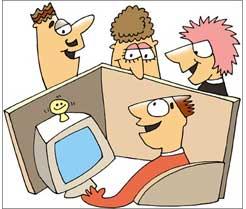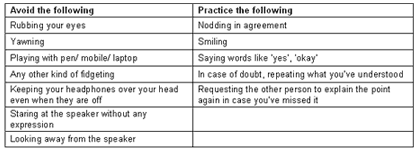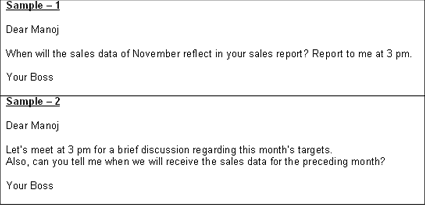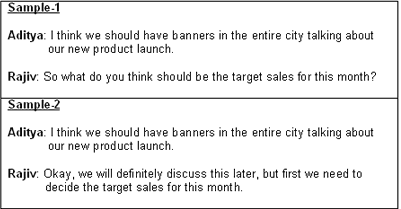 In our continuing series on employability skills, we look at the various aspects that make fresh graduates better communicators and more employable. Today, we discuss the second aspect of communication, which is 'expression'.
In our continuing series on employability skills, we look at the various aspects that make fresh graduates better communicators and more employable. Today, we discuss the second aspect of communication, which is 'expression'.
What is expression? Just as a building, constructed using brick and concrete, is incomplete without interiors, exteriors and ventilation, communication is incomplete without expression. Expression is the unstated part of communication left to be interpreted by the recipient. It is necessary to express ourselves clearly so that the receiver of the communication understands the communication in exactly the same way as we intend it to be.
Even if your grammar and vocabulary is not perfect, you can communicate very effectively by using simple words and sentences, and if you use the right expressions.
Without expression, communication remains incomplete and ineffective. Just think of a situation where you call p your old friend, and she says, "Hi. How are you? Where are you working these days?" Imagine this being said in a flat tone, without any excitement in her voice, and in contrast imagine if she just says "Hi!" with a jubilant voice. Which one would be more effective? Communication consisting of appropriate expression will be effective even with lesser number of words.
The same logic extends to professional communication. So here are a few things that you can practice and keep in mind to help become a more effective communicator.
Listen first
Most of us are not very good listeners. We tend to become bored and impatient when someone who is speaking to us. Though in some cases it may be because what the other person is saying is actually boring, most of the time, it is just the lack of listening skills. So here are some dos and don'ts to make you a better listener:

Give signals
Make sure that the statements spoken at one end are received at the other end. This may be on phone or when you are speaking face to face. If one person keeps speaking and the other one does not show any sign of listening to the same, then it leads to a very awkward situation. So if you are the listener in this setting, then make sure you say words like 'yes', 'okay', 'fine' etc to convey to the other person that you're hearing what he has to say. And in case you are the speaker and do not get any signal from the other end, then you may ask 'I hope I am being understood correctly', or 'I hope you are getting what I am saying'.
Keep track of punctuation marks while speaking
This is important so that the listener can know whether you are making a statement, asking a question, or just joking. So while you are speaking, pause appropriately at the commas and full stops, and aptly stress the question marks and exclamation marks.
Expression in witten communication
While it is easy to equip your communication with expressions during a face-to-face interaction, it is equally challenging to put such expression in the written form. You need to be careful and selective with your choice of words while you are using letters e-mail or SMS for professional communication. Notice the difference in the following two mails:

No doubt, Sample-2 goes better with a collaborative work environment normally found in today's knowledge economy. (More about written communication will be discussed in the upcoming articles.)
Abruptly changing the topic
Do not change the topic of conversation without acknowledging what the other person has just said. Ignoring what someone is saying is the easiest way to annoy that person, and you would not want to annoy your customer, client, colleague or a superior. If you think that the current topic needs to be closed, have the agreement of all on that before proceeding to the next topic. Which example do you think is better?

Sample-2 indicates that Rajiv has acknowledged Aditya's suggestion, whereas Sample-1 indicates that he might have completely ignored what Aditya had said.
Hand gestures
Extending the previous point, don't interrupt other person's statement by hand gestures or by speaking loudly -- unless you are in the group discussion process for a job. You should not try to raise your voice above the normal levels and cut the points which someone else might be making. In a professional setting, you ought to listen patiently to whoever is speaking to you -- be it the customer or a business partner or your colleagues.
Practice, but how?
Listen to news channels, radio jockeys and watch movies and observe how by varying the voice pitch and intensity, effective communication is achieved. Notice how a radio jockey changes her voice modulation to differentiate between a chat and a serious discussion. This will also be helpful in adopting the punctuation rules as discussed in point 3.
Bring out the artist within you
No, we aren't asking you to start taking acting classes, but just to start speaking out loud in an animated manner within the four walls of your room. This will give you confidence to speak with expression and you can practice without the fear of getting it wrong.
Part I: A 5-week guide to improve your communication skills
Mayank Gupta is an IIM Kozhikode alumnus and handles business development at BodhiSutra. BodhiSutra (www.BodhiSutra.com) is an IIT-IIM alumni venture which specialises in employability skills training programmes for graduate and postgraduate students. BodhiSutra offers both domain-specific programmes and general employability skills training programmes for students and working professionals.